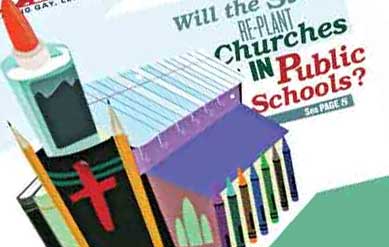Suddenly, it seems as though there was never a lull in the Culture Wars.
When the Obama administration announced a regulation that all employee health insurance programs — including those administered by hospitals and universities affiliated with faith communities — must provide access to contraception, the Christian right, including the nation’s Catholic bishops, acted as though the religious protections afforded Americans in their worship activities also extend to any other sort of nonprofit activity they might choose to engage in. It was disappointing to see progressive Democrats, such as Massachusetts Senator John Kerry, shrink from defending a crystal-clear constitutional principle.
It’s important to remember just how unrelentingly vigilant we must always be in preserving separation of church and state — especially given the anti-gay hostility of too many faith groups — even in a town as secular as New York.
Many otherwise progressive politicians are defending pending Albany legislation that would allow church groups to hold regular worship services in the city’s public schools. They point to the financial burden faced by small congregations, many of them serving communities of color and immigrants, in need of space.
Mixing up religious worship and public schools is simply not good policy.
There is ample evidence of a movement afoot to “plant” evangelical congregations — many of them with avowedly anti-gay missions — in the city’s public schools.
But gay and lesbian New Yorkers are not the only ones who would lose under such a scheme. Everyone has an interest in seeing that there be a clear divide between church and state. Nonbelievers will understandably be worried about the impact a school’s implicit imprimatur on a congregation’s worship services will have on their children who learn the basics of American citizenship there five days a week.
Given that schools are generally free to use only on Sundays, the unique access enjoyed by Christian congregations unfairly discriminates against Jewish and Muslim adherents, among other faith communities, under such a policy.
In addition, any church that uses school property must abide by all laws, including nondiscrimination provisions. But if a congregation denies anyone access — whether participating in a service or becoming a member — the city would have to investigate that denial and take appropriate steps. How long would it be before a congregation cries foul about state interference in its religious freedom?
The only sound policy is drawing as bright a line as possible distinguishing public school access from the ability to hold worship services.
Assembly Speaker Sheldon Silver suggests that a compromise might be possible, but his comments that access not be granted with “regularity” and that worship be distinguished from incidental prayer — as in the rental of space for a Passover Seder — will not satisfy either the small congregations currently meeting in schools or the right-wing advocacy group fighting this issue in court.
The Department of Education should follow existing city law — which laudably has strong support from Schools Chancellor Dennis Walcott and Mayor Bloomberg — and refrain from making public school space available for any form of religious worship. Faith congregations, like other community organizations, already have the right to rent school space for non-worship meetings on an as-available basis after school and on weekends. But in this country, no faith has the right to ask the public to build the house in which they gather to pray.




































